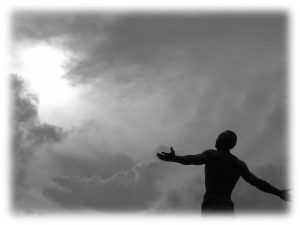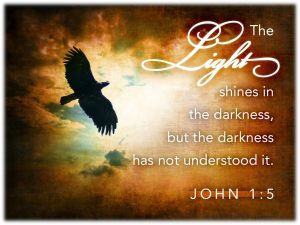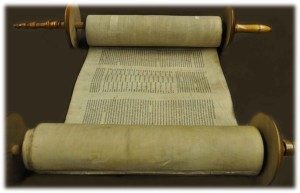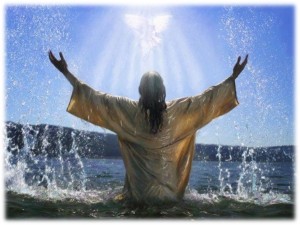JOHN 1:1-34 – Limiting the Transcendent
Finishing the Book of Deuteronomy yesterday, wasn’t just the end of a great story. It brought us to a crossroads. Up to this point in History (and in my Breadcrumbs), Believers in the Creator God have lots in common. Muslims, for example, are happy to talk about the Creator God and recognise His instructions to the world through the Law of Moses.
 Likewise, Jews have expended countless hours of energy picking apart the Torah – the first five books of HIStory. Not surprisingly, they’ve proven that the instructions given to Moses are both all-encompassing and endless. For centuries, they’ve built up an entire library of Law books – called the Talmud – to translate each instruction into everyday experience in each successive generation. But this impossibly limitless task of quantifying the Creator’s transcendent Law, leaves little time left for focusing on His transcendent Plan in the remaining books in HIStory.
Likewise, Jews have expended countless hours of energy picking apart the Torah – the first five books of HIStory. Not surprisingly, they’ve proven that the instructions given to Moses are both all-encompassing and endless. For centuries, they’ve built up an entire library of Law books – called the Talmud – to translate each instruction into everyday experience in each successive generation. But this impossibly limitless task of quantifying the Creator’s transcendent Law, leaves little time left for focusing on His transcendent Plan in the remaining books in HIStory.
With that said, though, modern day followers may struggle to understand the need to bother at all with ancient history related to a minor nation. It’s difficult to get the significance of the first contract – the Old Covenant – that the Creator God made with Moses and His family back then. Therefore, one can risk misjudging its importance for our own life, hope, and future. Still others ignore the lot because they’re completely confused by everything. So, let me fill you in…
In a nutshell, this epic Play is a global drama that’s only ever been about the Creator God fulfilling His own pipedream, being true to His Word, and being faithful to His own promise…
“Let Us make man in Our image, according to Our likeness; and let them rule…” [Genesis 1:26ff]
Everything that the Creator said in Chapter One of the Book of Genesis came true, just as His Word said it would UNTIL v26. Therefore, everything from Genesis 1:26 until the end of HIStory is about the journey that the Creator has been on, getting His human image-bearers into the state in which we’re identical in both image and likeness to God Himself. In our thinking, feeling, behaviour, and even our physical make-up as an eternal being, we’re 100% perfect, flawless, eternal image-bearer such that the only difference between us and Him, is that we’re created beings, and His is not.
So, looking briefly over my Breadcrumbs since January, after we messed that plan up (between 3-6 chapters into the storyline), the Creator eventually singled out one man – Abraham – then births several people groups through him. One of these people groups becomes a nation and, through this nation of Israel, the Creator God gives the world His eternal Guidebook for LIFE.[a]
Moses is the key player when we ended my Breadcrumbs yesterday. He compiled all the core instructions about what it would look like to behave in the likeness of God. The idea is that this one nation will be the Creator God’s example to the world i.e. what it’s like to be like Him; what it’s like to have a blessed relationship with the One who’s image we bear; and, what it looks like to walk in the opposite direction to the One who made us specifically to be like Him.
So now, skipping forward 15 centuries, 39 Acts in this epic drama have been played out and everything that Moses predicted in the Book of Deuteronomy (everything that you’ve  been reading over the last seven days of my Breadcrumbs) actually came true …the good, the bad and the truly ugly. Over the following one and half millenniums, the relationship between the Creator God and His image-bearers – those who should have been following Him and therefore most like Him – ended up seeming irreconcilable in their relationship with their Maker.
been reading over the last seven days of my Breadcrumbs) actually came true …the good, the bad and the truly ugly. Over the following one and half millenniums, the relationship between the Creator God and His image-bearers – those who should have been following Him and therefore most like Him – ended up seeming irreconcilable in their relationship with their Maker.
With that said, though, one thing is obvious from the very first pages: it’s not possible to limit the transcendent.
So neither the Creator nor HIStory is confided by quantified human experience. If it was, His Word wouldn’t be transcendent as He is transcendent. Both He and the words He has spoken to His creation, transcend all limits that we can place on them. And so we stumble across a hugely important piece of information – what if the Creator God’s Word is embedded in a person who transcends time and space with Him? Perhaps even someone the Moses met with face-to-face, spoke with, listened to, and followed…
“Behold, I’m sending my angel before you to guard you along the way and to bring you into the place which I have prepared. Be on your guard before him and obey his voice; do not be rebellious toward him, for he will not pardon your transgression, since My name is in him… truly obey his voice and do all that I say…” [Exodus 23:20-22a]
At the end of the Book of Deuteronomy, in yesterday’s Breadcrumb, Moses, and the entire nation of Israel, have just spent 40 years following a person who carried the Creator God’s Name inside Him. Whoever this person is, His role is to lead Father God’s family to the place that God has prepared in advance for them to go.
 Perhaps that may not sound too interesting. After all, Moses was a shepherd and many leaders have such a role. But this One has been given the highest authority in three ways. He carries the Name of God Most High within Himself. He’s been given authority to forgive (or not forgive) our rebellion. And, if the above two aren’t shocking enough, it’s this person’s voice that the Creator has specifically told us to be on our guard to obey, because His voice is synonymous with God’s word – “…truly obey his voice and do all that I say…”
Perhaps that may not sound too interesting. After all, Moses was a shepherd and many leaders have such a role. But this One has been given the highest authority in three ways. He carries the Name of God Most High within Himself. He’s been given authority to forgive (or not forgive) our rebellion. And, if the above two aren’t shocking enough, it’s this person’s voice that the Creator has specifically told us to be on our guard to obey, because His voice is synonymous with God’s word – “…truly obey his voice and do all that I say…”
Now you may be thinking: “Hang on, that was an angel in a desert talking to Moses. Who says that the same angel is still alive today, and appointed with that same role? And who said we’re supposed to still listen to His voice?” Well… this 1st Century writer in today’s chapter, called John, bridges time and space to explain why in today’s chapter…
“In the beginning was the Word, and the Word was with God, and the Word was God. He was in the beginning with God. All things came into being through Him, and apart from Him nothing came into being that has come into being. In Him was life, and this life was the Light of men.” [v1-4]
You can’t separate the Creator God from His word. This would limit and disable Him into a mute. But the Creator has done something shocking. He’s allowed an external being to be His voice and, if that’s so, then when the Creator said, “Let there be light”[a] He accomplished this, and all life known to us in our present created order, through His voice. God spoke, and the Word obediently went out to accomplish all that He said. [v3]
The word, carried out by the voice, is not just light for us to be enlightened by, but it’s our key to LIFE. [v4] This isn’t limited to just physical life here. Life, in the Creator’s Word, is unlimited eternal life. And the role of voice, was always about leading us to the place where the Creator God has prepared for His family to go.
 So, in a couple of sentences, John explains to us that the Creator’s word and His voice are both inseparable, there in the beginning, and that God’s Word is both light and life for us. The only problem – or spanner in the works – is that we’re either not listening or can’t comprehend. [v5] So the transcendent is once again limited by us.
So, in a couple of sentences, John explains to us that the Creator’s word and His voice are both inseparable, there in the beginning, and that God’s Word is both light and life for us. The only problem – or spanner in the works – is that we’re either not listening or can’t comprehend. [v5] So the transcendent is once again limited by us.
With 15 centuries of proof that His global plan had been limited in HIStory, and after many clues about a change of plan[b], Father God sent another John who, like Moses, would bear witness to the Light. [v6-8] Like Moses, John also had both a father and mother from the priestly line.[c] He was a forerunner before the Light of the World and came in the spirit and power of Elijah.[d] But what was his message?
The message was that the Creator God was sending His Light into the world once again. This time, it wasn’t the s-u-n but His s-o-n – that one who was carrying His Name inside Him. Yet because HIStory had proven that we weren’t on our guard to obey His voice, and over the centuries we didn’t follow our Maker’s Word – but instead, engaged in unforgivable rebellion – this now is the good news:
“…to as many as received Him, to them He gave the right to become children of God, to those who believe in His name, children who were born, not of bloodline descent, nor of the will of the flesh nor husband’s will, but born of God. [v12-13]
To make this possible, Father God limited His Transcendent Word and made His Name come in human flesh to dwell among us so that not just Moses, but we could all see for ourselves His glory, grace and truth. [v14] In the fullness of the Light of His Word, we can now receive grace upon grace [v16], which is not limited to time, space, nationality, or human frailty. No-one has seen the Creator, but the one begotten (who is at the bosom of the Father), He has explained Him. [v18]
In several places in the epic storyline (in the years between Moses and John), Father God mentions sending someone special who’ll correct/re-order/redeem all things – His Anointed One.[e]  By the time John came, the religious leaders of the day were on the lookout for the right person. [v19-22] But John wasn’t their Messiah. Although he was dressed like Elijah and came filled with the same spirit[f], John’s priestly role as a pure-blooded Levite, was to wash the people. [v23-27] This was in preparation[g] – just as Moses “consecrated the people” in preparation for the Lord’s presence to come.[h]
By the time John came, the religious leaders of the day were on the lookout for the right person. [v19-22] But John wasn’t their Messiah. Although he was dressed like Elijah and came filled with the same spirit[f], John’s priestly role as a pure-blooded Levite, was to wash the people. [v23-27] This was in preparation[g] – just as Moses “consecrated the people” in preparation for the Lord’s presence to come.[h]
Most significantly, and to show that the Creator God’s complex plan is a tapestry of interwoven threads (or a 3D puzzle with interlocking puzzle pieces that span millenniums) all this, in today’s chapter, took place at the place where Moses, in yesterday Breadcrumb, left the people to go up onto the mountain to pass away.[i] The next day, John saw Jesus and immediately cried out:
“Behold, the Lamb of God who takes away the sin of the world! [v29]
By calling Him “the Lamb of God”, John tells us that Jesus is going to die. It’s the first thing that comes out of his mouth. This is the plan and purpose for His coming as “the anointed one” – just as the ancient prophets Isaiah and Zechariah predicted.[j] The second thing John says is that through being the Lamb of God, He has the ability to “take away the sin of the world”. Or, as the Creator God put it in the days of Moses, he has the authority to forgive (take away) our rebellion.[k]
 John was told that a sign would accompany the One whom God would send. [v31-33] This One would be able to hand out God’s Holy Spirit to anyone – just as the ancient prophet Joel predicted.[l] John testified to what he had seen [v34], but one question over limiting our transcendent Maker, His Word and His Name, has remained open ever since ancient times…
John was told that a sign would accompany the One whom God would send. [v31-33] This One would be able to hand out God’s Holy Spirit to anyone – just as the ancient prophet Joel predicted.[l] John testified to what he had seen [v34], but one question over limiting our transcendent Maker, His Word and His Name, has remained open ever since ancient times…
“Who among you fears the Lord and obeys the Word of His Servant? Let the one who walks in the dark, who has no light, trust in the Name of the Lord and rely on their God.” [Isaiah 50:10]
CLICK to return to today’s “Daily Breadcrumbs”
[a] Matthew 24:35; Mark 13:31; Luke 21:33
[b] Genesis 1:3
[c] Isaiah 43:19; Jeremiah 31:31; Malachi 3:1
[d] Exodus 2:1-10 and Luke 1:5-17
[e] Luke 1:17
[f] Isaiah 7:13-14; Isaiah 9:6-7
[g] Malachi 4:5
[h] Malachi 3:1
[i] Exodus 19:10-11
[j] Deuteronomy 34:1
[k] Isaiah 42:1-4; Isaiah c53; Zechariah 13:7
[l] Exodus 23:21
[m] Joel 2:28-29